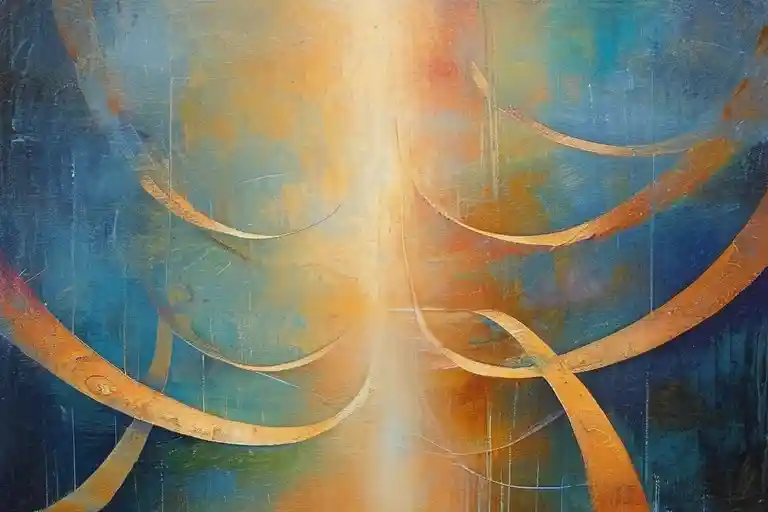If you had asked me five years ago whether I believed in destiny, I would have laughed—not out of malice, but from a place of absolute certainty that such ideas were little more than poetic fantasies. I was, by every measure, a rationalist. My world was built on observable facts, predictable cause and effect, and a quiet but firm dismissal of anything that couldn’t be measured, tested, or explained by science.
To me, the universe was vast, indifferent, and beautifully random. We humans were accidental guests in an incomprehensibly large cosmic arena—not protagonists in a prewritten story, but highly organized stardust with the curious ability to wonder about our own existence. I took comfort in that thought, in the sheer unlikeliness of it all. There was something humbling, almost freeing, in believing that nothing was meant to be.
I traced my lineage back to primordial cells and cosmic explosions, not to fate or purpose. Life, in my view, was a magnificent series of accidents—a chain of coincidences that somehow led to consciousness, love, loss, and everything in between. I wore my skepticism like armor. It protected me from what I saw as wishful thinking—the desire to believe that we’re here for a reason, that someone or something is keeping score.
And yet.
There’s a quiet irony in building your identity around doubt. The more certain you are of your own rationality, the less prepared you are for the moments that defy it. I didn’t know it then, but my understanding of the world was about to be dismantled—not by argument, but by experience. Not by a grand revelation, but by a slow, gentle unfolding of events that would lead me somewhere I never planned to go, to someone I never expected to meet.
This isn’t a story about abandoning reason. It’s about expanding it—about learning that some truths can’t be captured in data or diagrams. That sometimes, the most real things are the ones we feel before we understand them.
It began with a journey, but not a quest. There was no burning bush, no prophetic dream—just a series of small, seemingly insignificant choices that, in retrospect, feel less like accidents and more like steps. Steps toward a transformation I didn’t see coming.
The Rationalist Mind
Five years ago, if you’d asked about my worldview, you would have encountered what some might call militant rationality. I operated on a simple premise: we are biological accidents in a indifferent universe, nothing more than temporary configurations of stardust. The notion of destiny struck me as not just fanciful, but fundamentally arrogant—this idea that our tiny lives could possibly matter in the cosmic scale of things.
My perspective was firmly rooted in what I understood of science. The universe began with a bang, life emerged through evolutionary processes, and consciousness was simply a fascinating byproduct of complex neural networks. There was no grand design, no hidden meaning, no cosmic plan. We were, as I often told friends, “statistically inevitable accidents”—lucky to be here, but not special in any meaningful way.
This worldview manifested in practical ways. I made decisions based on logic and probability, dismissing intuition as unverified pattern recognition. When friends spoke of fate or meaningful coincidences, I’d gently explain the mathematical inevitability of unlikely events occurring in a large enough sample size. The universe didn’t care about our stories; it simply followed physical laws.
I remember specific conversations where I’d argue that human significance was a comforting illusion we created to avoid facing our cosmic insignificance. We’re like ants building elaborate colonies, unaware that our entire existence occupies less space than a speck of dust in the grand scheme. This perspective wasn’t depressing to me—it felt liberating. Without destiny or divine plan, every choice was truly free, every path equally meaningless and therefore equally valid.
My skepticism extended beyond metaphysical concepts to everyday superstitions. I found no meaning in serendipitous meetings, saw no patterns in numerical coincidences, and considered deja vu as nothing more than neurological glitches. When people spoke of things happening “for a reason,” I’d counter that we’re pattern-seeking creatures who impose narratives after the fact.
This rational framework served me well in many ways. It provided comfort in its consistency—the universe might be indifferent, but at least it was predictable according to discernible rules. There was no need to wonder about hidden meanings or cosmic messages because, in my view, there were none to find.
What I didn’t realize then was how much this worldview was itself a form of faith—a belief system built around the absence of belief. I was so certain of my certainty, so confident in dismissing what I couldn’t measure or prove. The irony, which would only become apparent later, was that my rationalism had become its own kind of dogma—complete with its own articles of faith and mechanisms for dismissing contradictory evidence.
This chapter of my life wasn’t without its value. That rigorous skepticism taught me to question assumptions, to demand evidence, and to think critically about extraordinary claims. These remain valuable tools. But I’ve since learned that some truths can’t be measured in a laboratory, some connections can’t be explained by statistics alone, and sometimes the most rational approach is to acknowledge the limits of rationality itself.
The universe, I’ve come to understand, might be more interesting than my reductionist worldview allowed. But that realization would require a series of events that my former self would have dismissed as statistically possible but meaningless—a chain of coincidences that would challenge everything I thought I knew about how the world works.
The Central American Turning Point
After months working on a sailboat along Belize’s barrier reef, I found myself deposited in Guatemala with a duffel bag and no particular plan. The rhythm of life at sea—the constant motion, the discipline of watches, the way horizons expanded and contracted with the weather—had created a peculiar mental space. I operated on practical considerations: tide charts, weather systems, the mechanical needs of the vessel. My worldview remained firmly rooted in observable cause and effect.
When the contract ended, I stood on a dusty Guatemalan roadside watching the taillights of my ride disappear. The sudden stillness felt jarring after months of constant movement. I had enough savings to continue traveling or return home. The rational choice would have been to book a flight back to structured reality—job interviews, apartment hunting, resuming the life I’d put on hold.
But something shifted during those days of wandering through Guatemalan highlands. Perhaps it was the accumulated effect of watching sunrises over open water, or the way navigating by stars had quietly altered my internal compass. The calculating part of my brain still dominated, but now there were whispers of something else—faint impulses that didn’t compute on spreadsheets.
Mexico hadn’t been on my itinerary. I’d studied maps, calculated budgets, and Mexico simply didn’t fit the most efficient route. Yet standing there with my backpack, the pull northward felt increasingly logical in a way that defied logic. The border proximity made it practical. The exchange rate favored my budget. These were the rationalizations I offered myself, but beneath them ran a current I couldn’t explain.
The bus ride to the border contained all the mundane details travel writers usually omit: the vinyl seat sticking to my legs, the vendor selling lukewarm sodas, the toddler crying three rows back. Yet every ordinary moment seemed charged with significance I wouldn’t recognize until later. At the immigration office, I almost turned back twice—once because the line moved too slowly, once because a German backpacker told me about better surfing in El Salvador.
Crossing into Chiapas felt both entirely ordinary and profoundly strange. The landscape resembled Guatemala’s, but the quality of light seemed different—softer somehow, though that might have been imagination. I spent days moving north without particular urgency, following recommendations from other travelers, sometimes ignoring them on whims I didn’t understand.
The decision to divert to Baja California came from a water-stained guidebook left in a hostel common area. I’d been heading toward Mexico City when the photo of desert meeting sea caught my attention. The description mentioned seasonal work at eco-hostels—practical enough to justify the detour.
I remember the exact quality of afternoon light when I stepped off the bus in Baja. The air smelled of salt and creosote bushes. My budget demanded finding work quickly, and the first place I tried had just hired someone the previous day. The second place didn’t need help. At the third—a cluster of palapas overlooking an empty beach—I found myself talking with a man who’d arrived himself just weeks earlier.
There was no lightning bolt moment, no cinematic recognition. Just a gradual dawning that every seemingly random choice—the delayed bus in Guatemala City, the forgotten sunscreen that made me seek shade where I overheard someone mention Baja, even the argument with another traveler that made me choose a different hostel—had been conspiring to bring me to this particular patch of sand at this particular moment.
We talked for hours as the sun dipped below the horizon, not about destiny or fate, but about sailing routes and books and why people feel drawn to certain places. The conversation felt both completely ordinary and utterly extraordinary. I took the job tending bar, partly because I needed the money, partly because something deeper than practicality told me to stay.
What fascinates me now isn’t the meeting itself, but the intricate chain of ordinary decisions that made it possible. Had I been more rational, I would have flown home from Guatemala. Had I been less impulsive, I might have skipped the dog-eared guidebook. Had I been more practical, I wouldn’t have taken a job paying mostly in tips and sunset views.
Yet each apparently small choice—each yes or no to seemingly insignificant opportunities—created convergence points I couldn’t possibly have anticipated. The journey taught me that transformation rarely arrives through dramatic interventions, but through accumulated ordinary moments whose significance only reveals itself in retrospect.
The experience didn’t convert me to any particular belief system, but it did crack open my certainty about how the world works. I began noticing how often seemingly random events connect in patterns too complex to predict yet too precise to dismiss as coincidence. It made me wonder whether destiny might simply be what we call the pattern once we’re finally able to see it.
The Hidden Logic of Coincidence
Looking back at that journey through Central America, what seemed like a series of random choices now reveals a different pattern. Each decision—accepting the sailboat job in Belize, getting off in Guatemala, crossing into Mexico on a whim—contained its own logic that only became apparent in retrospect.
Psychology offers some insight into this phenomenon. The concept of ‘serendipity’ describes those fortunate accidents that seem to occur when we’re open to new experiences. Research in cognitive science suggests that what we often dismiss as coincidence might actually be our subconscious mind connecting dots that our conscious awareness hasn’t yet processed. Those seemingly minor decisions—taking a different route, striking up a conversation with a stranger, following a sudden impulse—often stem from deeper intuitions we haven’t learned to trust.
The transformation from skeptic to someone who recognizes meaning in chance events didn’t happen overnight. It began with small realizations: how saying yes to opportunities I would have previously declined led to unexpected connections, how being in the right place at the right time often followed periods of openness rather than careful planning.
Cognitive psychologists talk about ‘confirmation bias’—our tendency to notice evidence that supports our beliefs while ignoring what doesn’t fit. For years, my confirmation bias reinforced my rationalist worldview: I saw coincidences as statistical probabilities rather than meaningful events. But that day in Baja California, something shifted. The accumulation of small ‘accidents’ that led me to that particular beach, that specific job, that exact moment when our paths crossed—it felt like more than random chance.
This isn’t about abandoning critical thinking for mystical beliefs. Rather, it’s about recognizing that some experiences defy purely rational explanation. The human mind seeks patterns, and sometimes those patterns reveal deeper truths about how our lives unfold. What appears as destiny might simply be the convergence of prepared minds with unexpected opportunities.
The journey of transformation often begins when we allow for possibilities beyond our current understanding. It requires holding two seemingly contradictory ideas simultaneously: maintaining healthy skepticism while remaining open to experiences that challenge our existing frameworks. This balance between reason and receptivity creates the conditions where meaningful change can occur.
Perhaps the most significant shift was learning to trust those moments of intuition—the gut feelings that whispered ‘go to Mexico’ even when it made no logical sense. Modern psychology validates what many cultures have long understood: that our unconscious mind processes information differently than our conscious reasoning, sometimes leading us toward opportunities we couldn’t have rationally predicted.
This awakening to life’s hidden connections doesn’t require abandoning scientific thinking. Instead, it invites expanding our definition of what’s possible. The universe operates through both measurable laws and mysterious synchronicities, and embracing both allows for a richer engagement with life’s possibilities.
What changed most profoundly was my relationship with uncertainty. Where I once sought definitive answers and clear explanations, I now find beauty in the unanswered questions. Some experiences simply transcend rational analysis, and in that space beyond explanation, the most meaningful transformations often occur.
Redefining Destiny and Free Will
Looking back at that chain of events—Belize, Guatemala, the impulsive decision to cross into Mexico—I’ve come to see something deeper at work. What I once dismissed as random occurrences now feels like pieces of a puzzle I wasn’t aware was being assembled. This isn’t about surrendering to some predetermined script, but rather recognizing that within what appears to be chance, there often exists a curious kind of necessity.
My transformation wasn’t about abandoning reason for mysticism. Rather, it was about expanding my understanding of how the world works. I still believe in cause and effect, in the logical progression of events. But I’ve made room for the possibility that some connections aren’t immediately apparent to our rational minds. The universe might operate on patterns too complex for our linear thinking to grasp in the moment.
This new perspective creates an interesting tension between destiny and free will. I don’t believe our lives are completely mapped out before we’re born. We still make choices—sometimes small, seemingly insignificant ones that nevertheless alter our trajectory profoundly. That decision to go to Mexico? That was mine. But what made me make it? Was it really just whim, or was there something deeper guiding me toward what I needed to experience?
What I’ve learned is that being open to possibility doesn’t require abandoning critical thinking. It’s about balancing our natural skepticism with a willingness to recognize when something meaningful is happening. The rational mind wants evidence; the intuitive soul recognizes truth in ways that can’t always be quantified. Both have value. Both deserve a seat at the table when we’re making decisions about our lives.
This balance has changed how I approach each day. I still make plans, set goals, and think through decisions carefully. But I also leave space for spontaneity, for following hunches, for saying yes to opportunities that don’t necessarily fit into my master plan. Some of my best experiences—both personally and professionally—have come from these departures from the expected path.
There’s a certain freedom in this approach. Instead of seeing life as either completely random or rigidly predetermined, I’ve found a middle ground that feels both empowering and humbling. I’m responsible for my choices, but I’m also open to the possibility that sometimes the choices that matter most are the ones that feel like they’re choosing me.
This transformation in thinking has made me more attentive to the small moments—the chance conversations, the unexpected invitations, the books that seem to find me at just the right time. I’ve learned to trust my instincts more while still applying discernment. I’ve become better at recognizing when something feels significant, even if I can’t immediately explain why.
What’s interesting is how this shift has affected my relationships with others. I’m more curious about people’s stories, more interested in how they came to be where they are. Everyone has these turning points—these moments where something shifted, often because of what seemed like a small decision at the time. Listening to these stories has only reinforced my sense that there’s more at work in our lives than pure chance.
This isn’t about finding meaning in every little thing. Some events are truly random; some coincidences are just coincidences. The trick is developing the wisdom to know the difference—to recognize when something carries weight and when it’s just background noise. This discernment grows with practice, with paying attention, with being willing to learn from experience.
My transformation from skeptic to someone who believes in destiny—or at least in a more mysterious version of how life unfolds—has been gradual. It didn’t happen overnight. It came through reflecting on my experiences, through noticing patterns, through being honest enough to admit that my previous worldview might have been too limited to account for everything I was encountering.
This new perspective hasn’t made me less analytical. If anything, it’s made me more thoughtful about the interconnectedness of things. I still value evidence and logic. But I’ve added another tool to my kit—the willingness to consider that some truths might reveal themselves through means other than pure rationality.
What’s emerged is a more nuanced understanding of how change happens. Major transformations often begin with small steps—a decision to talk to a stranger, to take a different route home, to try something outside your comfort zone. These small actions create ripples that sometimes lead to unexpected destinations. The key is being awake enough to notice when those ripples are leading somewhere meaningful.
This approach to life requires maintaining a certain tension—between making plans and remaining flexible, between pursuing goals and being open to better opportunities that might appear along the way. It’s not always comfortable, but it’s rarely boring. And it’s led me to places—both geographically and emotionally—that I never would have discovered if I’d stuck exclusively to my original, strictly rational worldview.
What I’ve come to understand is that destiny isn’t about having your life written in stone before you’re born. It’s about recognizing that the choices we make—and how we respond to the circumstances we encounter—create patterns that eventually become our lives. Some of these patterns we consciously choose; others seem to emerge from something deeper than our conscious intentions.
The beauty of this perspective is that it honors both our agency and the mystery of how life unfolds. We’re both the architects of our lives and the students of something larger than ourselves. We make choices, but we also learn to listen—to our intuition, to opportunities, to the subtle nudges that sometimes guide us toward what we need rather than what we think we want.
This transformation hasn’t answered all my questions about how the world works. If anything, it’s raised new ones. But I’ve come to appreciate the questions themselves as valuable. They keep me curious, open, and engaged with the mystery of being alive in this complex, beautiful, and often surprising world.
Creating Your Turning Points
We often think of life’s pivotal moments as things that happen to us—external events that arrive like lightning strikes. But what if we could cultivate the conditions that make these transformations more likely? After my own experience in Baja California, I began seeing how certain practices create fertile ground for destiny to take root.
Keeping an open mindset isn’t about abandoning reason or critical thinking. It’s about recognizing that our rational minds have limitations. I’ve found that maintaining a daily practice of questioning my own assumptions creates space for unexpected possibilities. Each morning, I ask myself: “What might I be wrong about today?” This simple question has consistently opened doors I would have otherwise walked right past.
There’s practical magic in saying “yes” more often to opportunities that feel slightly outside your comfort zone. I’m not suggesting reckless abandon—rather, a conscious practice of leaning into experiences that intrigue you even when they don’t fit your established life narrative. That spontaneous decision to visit Mexico despite having no prior interest? That came from months of small yeses that built my capacity for larger leaps.
Recognizing meaningful opportunities requires developing what I call “serendipity awareness.” Most people walk through life wearing blinders formed by routine and expectation. I started keeping a coincidence journal where I note seemingly random connections and occurrences. Over time, patterns emerged that helped me distinguish between mere chance and genuine synchronicity. The key is observing without forcing conclusions—allowing connections to reveal themselves rather than hunting for significance.
Balancing intuition with rational decision-making might be the most practical skill I’ve developed. I use a simple framework: for any significant decision, I check in with both my gut feeling and logical analysis. If they align, I move forward confidently. If they conflict, I pause and explore why. Often, the tension between intuition and reason reveals hidden assumptions or unmet needs that need addressing before moving forward.
Creating space for transformation often means clearing out mental clutter. I regularly practice what I call “mental decluttering”—questioning which beliefs, routines, and commitments still serve me and which simply exist out of habit. This creates psychological space for new people, ideas, and opportunities to enter your life. It’s remarkable how many transformative encounters happen precisely when we’ve made room for them.
Developing what psychologists call “cognitive flexibility” has been crucial. This means practicing the ability to hold multiple perspectives simultaneously and switch between different ways of thinking. I intentionally expose myself to viewpoints that challenge my own, read outside my usual genres, and engage with people whose life experiences differ dramatically from mine. This mental stretching makes us more receptive to the unexpected ways destiny might manifest.
There’s also value in learning to recognize the difference between resistance and genuine red flags. Our protective instincts often misinterpret the discomfort of growth as danger. I’ve developed a simple questioning technique: When I feel resistance toward an opportunity, I ask whether it triggers fear of failure or actual alignment issues. More often than not, it’s the former.
Practical opportunity recognition involves training yourself to notice patterns in what energizes versus what drains you. I started tracking my energy levels throughout the day and noting which activities created flow states. Over time, I could predict which types of opportunities would likely lead to meaningful growth versus those that would simply keep me busy. This discernment has been invaluable in making choices that align with my deeper purpose.
Perhaps most importantly, I’ve learned to embrace what author John Keats called “negative capability”—the ability to exist in uncertainty without reaching for definite answers. This might be the ultimate practice in allowing destiny to unfold. Rather than constantly seeking clarity and certainty, I’ve become comfortable with not knowing how things will turn out while still moving forward with intention.
These practices aren’t about manipulating fate or forcing transformations. They’re about creating the internal conditions that allow meaningful change to occur naturally. The beautiful paradox is that by developing these skills, we become active participants in our destiny while still remaining open to its unexpected manifestations. We learn to dance with chance rather than trying to control it—and in that dance, we find both freedom and meaning.
Embracing the Unknown
Looking back at that series of seemingly random decisions—taking a job on a sailboat in Belize, crossing into Guatemala, making that spontaneous choice to visit Mexico—I now see them not as isolated accidents but as connected steps leading somewhere meaningful. The person I met in Baja California didn’t just change my life; they helped me understand that some connections are too significant to be mere coincidences.
This realization didn’t require me to abandon rationality or embrace mystical thinking. Instead, it invited me to expand my understanding of how the world works—to recognize that while we may indeed be small in the vastness of the universe, our lives can still carry profound meaning and purpose. The mathematical probability of any particular event occurring might be low, but when we’re open to new experiences, we increase the chances of meaningful connections happening.
What if the most rational approach isn’t dismissing the concept of destiny entirely, but remaining open to the possibility that some events carry more significance than others? What if being truly logical means acknowledging that we don’t have all the answers—that some experiences defy easy explanation?
I’ve learned that transformation often begins when we release our need for complete control and certainty. The beauty of life lies not in having everything figured out, but in remaining curious about what might unfold. Those unexpected moments, the chance encounters, the decisions made on a whim—they might be leading you somewhere important, even if you can’t see the entire path yet.
So I’ll leave you with this: What seemingly small decision have you been hesitating to make? What unfamiliar path have you been curious to explore? Sometimes the most rational thing we can do is acknowledge that we don’t know where a choice might lead—and make it anyway.
Your own series of meaningful events might be waiting to unfold. The only way to find out is to stay open, stay curious, and take that next step into the unknown.





